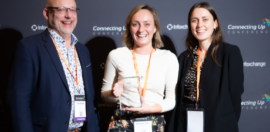NFPs Get Digital Toolbox to ‘Win at the Internet’

26 September 2016 at 5:12 pm
Not for Profits and social enterprises are being given a chance to harness the power of digital technology with the launch of Australia’s first online toolbox for the social sector.
The Fitzroy Academy, an online video learning platform, has been designed to teach the social sector “cutting edge” digital skills such as crowdfunding, agile project management, basic web design and social media in a bid to make the sector as digital savvy as the corporate world.
The project, developed in partnership with the Telstra Foundation and launched on Monday, hopes to capture the expertise of industry leaders in easy to digest 20-minute lessons, while also providing a vital platform for discussion and co-learning with peers.
Fitzroy Academy founder and CEO Will Dayble told Pro Bono Australia News making digital work for the social impact sector was a complete gamechanger.
“You can scale up impact, explore new models of funding, streamline budgets, back up grant applications with solid plans and reporting, and get business rhythms down to a fine art,” Dayble said.
“Digital skills allow you to take the important basics in house, and take the guesswork and stress out of working with a digital agency.
“Great digital shouldn’t be an expensive burden, and when your whole team has basic tech skills, there’s less chance of your organisation’s entire digital knowhow walking out the door when someone moves on.”
Fitzroy Academy originally started in 2013 as an accelerator program for startups and entrepreneurs and has since worked with researchers, universities and businesses to develop more sustainable models for delivering education.
In 2016 the academy decided to go completely online, and focus on the Not for Profit and social impact world.
Dayble said the decision opened it up to more people and ensured a higher quality.
“We ran accelerators in person and they worked really well but they are mega expensive which basically means that rich people can afford them and poor people can’t, which excludes a giant chunk of the Aussie population from getting involved in any kind of ‘start-upy’, innovation-type stuff,” he said.
“So it was really a ‘so more people can afford it thing’ from our point of view.
“The other thing was that it is actually really hard to run a high-quality accelerator in Australia, with the number of people that we have, there are only so many really good mentors and teachers and so on and so forth, and most of them just don’t have time to get involved with all of these accelerators.
“So we kind of have this funny thing where the more physical accelerators there are the poorer quality they will all become because there are only so many people and so many hours in the day that you can spread amongst all of them. Whereas with videos, it means we can film somebody in a few hours, get them online and then they are there forever.”
Dayble, who previously founded Squareweave, an accredited B Corp dedicated to the social impact sector and Cowalition of the Willing, a social enterprise which lifts small-plot Cambodian farmers out of poverty with micro investment and education, said it made sense to focus on the social impact sector.
“Entrepreneurs have enough help otherwise honestly,” he said.
“There’s accelerators and support and money going up left, right and centre and as seems to be traditional in Australia, social enterprise is getting left behind a bit. So we kind of figured out we would use all the stuff we’d learnt from the entrepreneurship stuff and then package it up for the social impact sector.
“I’ve been working in the social impact sector for a decade or more now so it’s kind of like I know it, these are my people, it makes a lot of sense.”
Dayble said the sector still had a long way to go to be “winning at the internet”.
“It’s very hard to tar anything with one great big brush but just by virtue of population and distance and stuff, the Aussie social sector is far behind America and elsewhere,” he said.
“I think it is just one of these things where there is no such thing as a non-tech business anymore, it’s like every single business, social enterprise, charity in the entire world is on the internet now, and so not doing anything on the internet is kind of like demanding that everyone uses carrier pigeons and faxes, it’s how reality works now.
“So it’s less a case of going ‘hey the internet is really cool, we should do this’ and it’s more a case of just catching up with the rest of the world. We are going to be putting people on rocket ships to Mars, the social impact sector is going to have catch up with that speed.”
Dayble said Not for Profits and social enterprises just needed to start with the basics.
“When we were first doing all of our research and development stuff for this we found out there is actually a few really basic skills that everyone needs to learn, like agile and lean and stuff, and once you nail those things a lot of the other stuff is really kind of organisation by organisation specific,” he said.
“So we could never make like a teaching playlist that suited everyone without covering just the basics.
“We thought we were going to have to create this giant, massive horrible swell of content but actually it turns out that just doing the basics really well is all that most orgs need which is weird I guess.
“We’ve had a lot of requests for more UX and agile stuff, those seem to be the hot topics at the moment, I think mostly because they are stuff that you can do without writing any code but can have huge impacts for social impact mob.”
Telstra Foundation general manager Jackie Coates said digital innovation and technology presented Not for Profits with big opportunities to deliver products, services and programs in new ways.
“At Telstra – we see Not for Profits as the heroes of our community,” Coates said.
“We also believe in the power of digital innovation and we’ve partnered with this project because we want this sector to have the same opportunities as others to think bigger, bolder and in a different way.
“It doesn’t matter what size a Not for Profit is – this new platform provides cutting edge, innovative, and most importantly practical training, to maximise the opportunities of the digital world. I see a genuine need and a big appetite to skill up in this area, and the good news is, there’s now the truly unique Fitzroy Academy to start the journey.”
Youth leadership and anti-bullying organisation PROJECT ROCKIT CEO Rosie Thomas said digital was an “experiential skill” and figuring out where to start was often the hardest bit.
“That’s why Fitzroy Academy is a go to for the team ” Thomas said.
“Will and his teachers don’t teach old fashioned theory stuff – they teach you how to teach yourself and get stuff done for real. In particular, the videos and digital tools have really given our team a shared language around how we can work together as a high performing unit.”
Dayble said he was excited about the feedback.
“The thing that I am most excited about is I occasionally physically go and see lots of Not for Profits and social enterprises and I go and give them one to one mentoring and stuff and whenever I talk to one of them and you hear… them going ‘oh yeah, half the stuff wasn’t applicable but the half that is we’re using and stuff got better here’. The immediate feedback of knowing it works, that’s the thing, I could live on that.”
Fitzroy Academy’s full suite of video lessons are available for $9 a month. To mark the launch, they are offering a free two-week trial for all new users from the Not for Profit and social impact sector.







